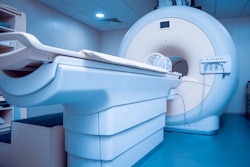Using a "circular" business model to replace aging MRI scanners -- that is, upgrading an existing device rather than buying a new one -- offers many benefits to hospitals, patients, and the planet, according to a study published October 7 in the Journal of the American College of Radiology.
"By embedding innovative procurement strategies, imaging centers can deliver care with less cost while reducing greenhouse gases and saving critical materials," wrote a team led by Elizabeth Snyder, MD, of Vanderbilt University Medical Center in Nashville, TN.
Imaging volumes continue to increase, and radiology departments face "mounting pressure to modernize their equipment while managing both financial and environmental costs," the authors noted. As scanners constitute a major part of radiology's cash outlays, departments are often in a bind when it comes to updating equipment that will provide the most current technology. Upgrading an existing scanner can be an effective solution to the problem.
Snyder's group compared the replacement of an MRI scanner via three business models:
- Linear replacement: An existing MRI scanner is replaced with a new one.
- Circular upgrade: An existing MRI scanner is upgraded onsite at the end of its life span. All components are replaced except the magnet.
- Circular refurbishment: An existing MRI scanner is refurbished, with the used magnet transferred from the user to the manufacturer. The refurbished scanner is then reinstalled.
The team evaluated the impact of these three models on the total cost of ownership of the scanner for the hospital, and used life cycle assessment data to compare greenhouse gas emissions and materials used.
Overall, the authors reported the following regarding circular business models:
- They reduced the total cost of MRI scanner ownership by up to 21%.
- They reduced greenhouse gas emissions by up to 8% when using a typical energy grid, 37% when using a renewable one.
- They reduced material use by up to 92%.
"We found that upgrading an existing scanner on site delivered the most beneficial gains, driven primarily through reuse of critical components," they wrote.
The findings could offer radiology departments a new framework for extending the life of their current MRI scanners, according to the team.
"We recommend that hospitals consider upgrading existing MRI scanners onsite or purchasing refurbished scanners before replacing with entirely new ones," the authors concluded.
The complete study can be accessed here.




















